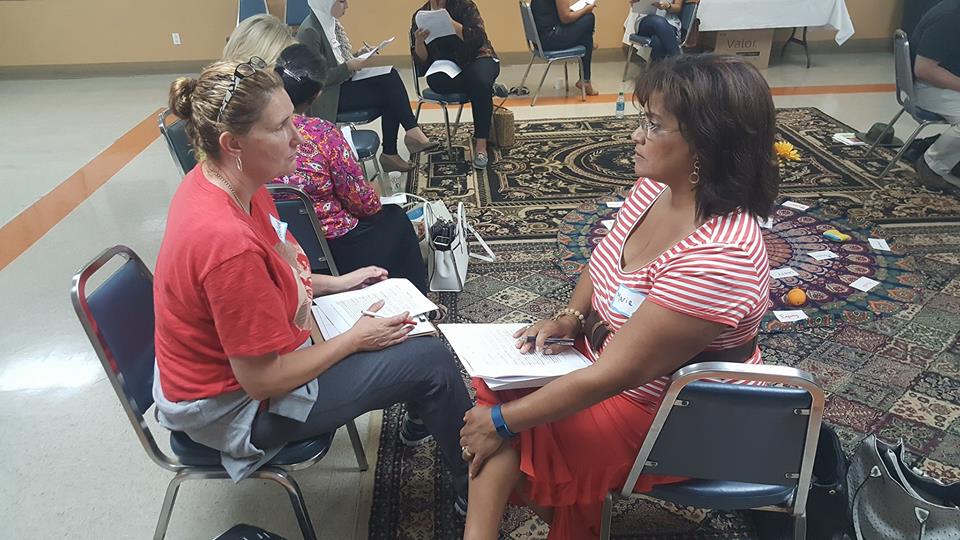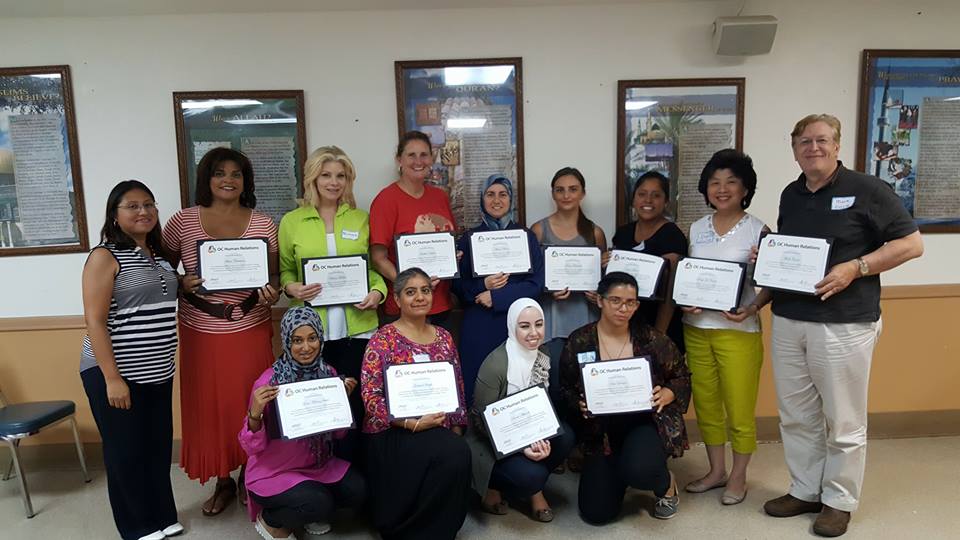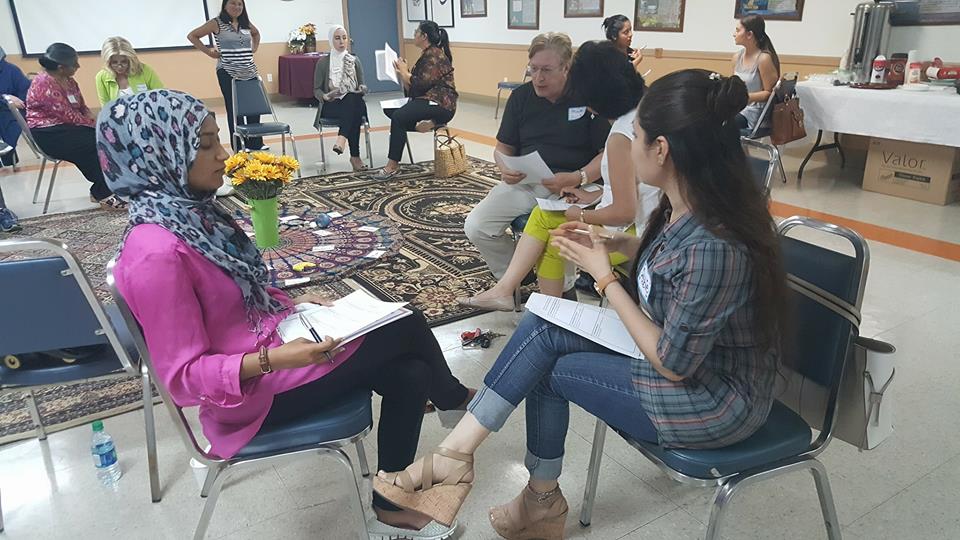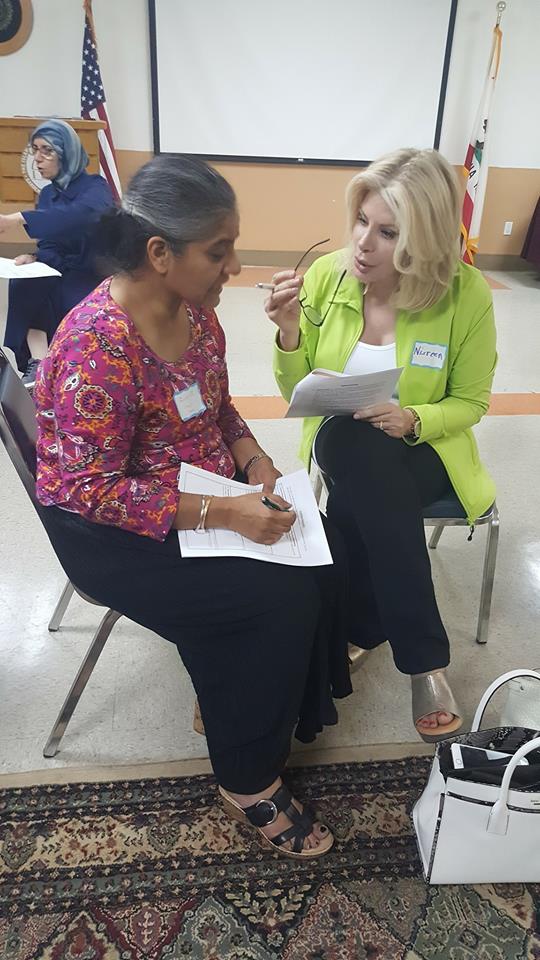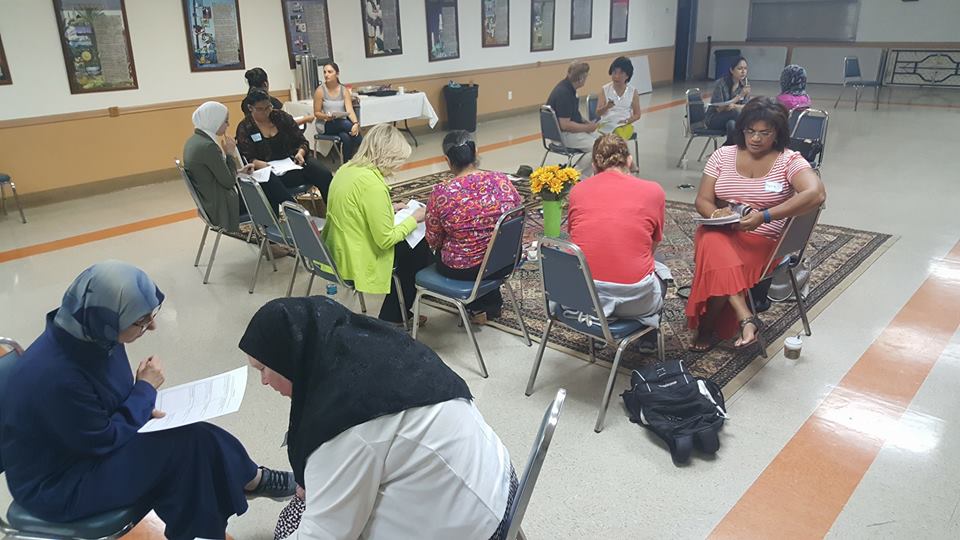Having a person to talk to about anything from family, drama at school, or if you just need to let out some thoughts is a really nice key thing at school.” – 8th Grade Student
Overview
OC Human Relations Restorative Schools Program seeks to address the ineffectiveness and disproportionality that arises in more traditional school discipline systems by bringing a Restorative Justice perspective to the school setting. Accomplishing this goal requires the school community to commit the time and resources necessary to create a school culture focused on the core values of respect, relationship and responsibility. When contracted by a school, OC Human Relations will work collaboratively with school community stakeholders to embed Restorative Practices, a combination of community-building and restorative justice techniques, in the following areas:
Area of Focus Objective Classroom & School-wide Culture Build community, de-escalate conflict and foster accountability in a positive supportive environment in the classroom and across the campus Restorative Discipline Intervention Directly engage those involved in and impacted by an incident in understanding what happened and deciding how to make things right At-Promise students receive Community-engaged support Support individual students by bringing them together with community members in a collective process to understand their needs and provide avenues for success
Having this program has helped us grow closer as a school. Chelsea is always there when we need her and always has an open mind when it comes to problems.” – 8th Grade Student
Implementation Approach
Successful implementation involves providing a Restorative Practices [RP] Coordinator with a designated space on campus to perform the following functions:
Consulting Bring a Restorative Justice perspective into school-wide planning initiatives as well as program implementation and evaluation efforts Modeling Lead RP activities where school community members can experience a restorative approach firsthand Training Provide a series of training and workshops in RP techniques accessible to the whole school community- teachers, administrators, students, and parents Mentoring Work directly with individual staff members to effectively and authentically embed RP skills in their everyday work in the classroom and across the school campus Managing Cases Provide an opportunity for students referred for disciplinary action to participate in a Restorative Justice process in lieu of or in conjunction with standard school disciplinary protocols
Restorative Justice by the Numbers
OC Human Relations’ Restorative Justice Program is currently running in eight Orange County Schools: Ball Jr. High School, Brookhurst Jr. High School, Columbus Tustin Middle School, Dale Jr. High School, La Quinta High School, Pacifica High School, Sycamore Junior High & Tustin High School.
Since 2017 our team has offered:
- 1,308 Consultations – meetings about program implementation and/or working 1:1 with adult educators to use restorative practices
- 826 Mentoring Sessions – strategic meeting with staff member on how they will utilize specific RP techniques in their role in the school and/or providing feedback after observing them
- 538 Modeling Sessions – a restorative practice is provided by a RJ Specialist to model the practice and help adults and students learn about restorative justice
- 1,312 Student Development Sessions – direct work with students utilizing restorative practices to support
Over 1,000 cases have been referred for a restorative conflict resolution process with an average resolution rate of 97%.
Restorative Justice Success Stories
“A restorative dialogue was held between a teacher and a student. The teacher wanted to let the student know that she cared for and wanted to work with her to make some changes in their student-teacher relationship. The teacher and student agreed to meet to discuss what has been happening in class and worked together to make agreements to move forward. A few days following the restorative dialogue, the teacher approached the RJ specialist and stated that she shared with both her department team and her classes how impactful her experience was doing a restorative dialogue. The teacher commented that she really valued this experience in getting to know her student on a deeper level and working with her to address issues in their relationship. The student shared that she was grateful for her teacher’s support and was looking forward to making progress with her grades in the class. This story highlights the power of intentional efforts to build relationships with young people and honoring their voices to problem-solve alongside adults.”
“A teacher wanted to let a student know that she is here for her and wanted to work with her to make some changes in their relationship. The teacher and student both agreed to meet to discuss what happened and made agreements to move forward. Both the student and teacher thanked RJ specialist for supporting their efforts to address their conflict and strengthen their relationship. After a month, the teacher and RJ specialist discussed having a follow up meeting. The teacher shared that she asked the student if she was interested in having a meeting to discuss the progress made on their agreements and the student agreed. During the follow up meeting, the new bilingual instructional aide joined the conversation to provide further support to both the student and teacher. Agreements were reviewed and both the teacher and student agreed that they were successful at achieving them. They celebrated their success with high-fives and smiles. The student and teacher then decided to add a few new agreements to support them in finishing off the year strongly. The bilingual instructional aide offered her support in helping see these agreements through along with the teacher and student. The restorative dialogue ended with the teacher expressing gratitude to the student, bilingual instructional aide, and to RJ specialist for sharing the space with her and taking part in the process. The student also shared that she was looking forward to upholding the agreements with the support of her teacher and the bilingual instructional aide. A few days following the restorative dialogue, the teacher approached RJ specialist and stated that she had shared with her department team as well as her classes how impactful her experience doing a restorative dialogue was. She shared that she really valued this experience in getting to know her student more and working together to address issues in their relationship.”
“At the start of the year, a 7th grade student was referred to RJ due to a conflict involving herself, her sister, and some 8th graders. A circle was held and successfully cleared things up and resolved the issue. That 7th grade student continued coming to the RP room regularly during lunch because it made her feel safe. Eventually, she began bringing in her friends and requested circles be held among all of them because she enjoyed the process. This group grew to ten students total and became the “Circle of Friends” which would meet weekly during lunch to have community building circles. The goal of restorative practices on campus is to make sure all students feel safe and secure on campus, and building a sense of community on campus, as the Circle of Friends did, reduces the need for conflict intervention work.”
“Working with Ms. B and C.G. was more than a joy, it was a challenge that resulted in unanticipated wins. She referred to him on multiple occasions, but he initially participated in both a circle (with her and a sped aide) and a facilitated reflection with the restorative justice specialist. It became evident that the root of the conflict was beyond what was visible in class, and the RJ specialist learned about challenges he faced at home (“babysitting” younger family members and being yelled at by his adult sisters) via restorative questions. Trust was built, referrals were made and a plan was co-created (with student) for behavioral improvement. It was an ongoing challenge to remind him of and support him in upholding his commitments, but he showed progress and one day Ms. B invited the RJ specialist to play the UNO card game with them after school because it was a part of a reward he earned in class (great informal relationship building activity). She later referred him for support to explore the internal/ familial conflicts that arose after his spring IEP meeting. It was determined that he’d be moved to other classes in the upcoming year and she knew he’d be frustrated and confused about the decision (his parents expressed judgement towards his disability). The RJ specialist met with him about the transition and Ms. B followed up to assure him that he’d be supported more appropriately there, and even identified peers he had good bonds with who’d be moving with him. There are many successes in this journey, but the collaboration that took place between the student and adults is evident that multiple supports, when used together, produce effective outcomes like social emotional skill building and trauma informed community care. This can all impact academic success, too.”
For more information, please contact the Director of Youth & Education Programs, April Van Ligten, at april@splash.ochumanrelations.org or 714.480-6589.
Building community, responding to harm and conflict, and providing circles of support for the school community
